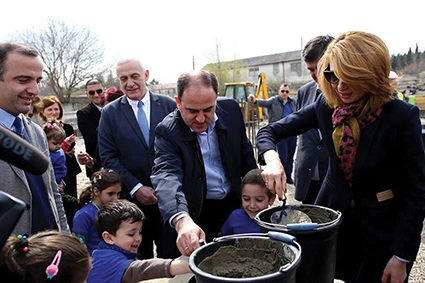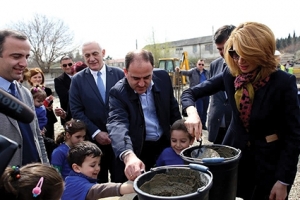Head of Tbilisi Kindergarten Management Agency on Kindergarten Reforms
INTERVIEW
The Tbilisi Kindergarten Management Agency aims to create a comfortable, healthy and friendly environment for the youngest citizens to live and be raised in. The agency works in multiple directions and has an essential responsibility, from maintaining existing infrastructure to establishing new infrastructure, from improving and renewing educational programs to ensuring the high standards of sanitary, hygiene and nutrition norms are met.
The Agency unites 166 Tbilisi kindergartens. It monitors and controls the work of each kindergarten teacher and its technical staff and it works on methodology and various projects aimed at improving the legislative base.
“We’re the closest to kindergartens and we know first-hand what the legislation system is facing today. The fact that kindergartens are free and accessible to everyone is crucial,” says Temur Tordinava, Head of Tbilisi Kindergarten Management Agency.
How would you characterize the situation in Tbilisi kindergartens today?
TEMUR: We have made a lot of ambitious reforms- too many to mention here. In order to get an idea what the situation looks like in Tbilisi kindergartens today, we have to understand what it was like three years ago. The situation we inherited was difficult, with 50 kindergartens closed, others with outdated interior and outdoor infrastructure, many severely damaged and urgently in need of repair. The majority of kindergartens had no fences, so child safety was a serious issue. The heating systems didn’t work and the kindergarten yards needed repair works, too. Our first step was to find additional spaces in kindergartens; adding and opening new groups for children so that 5500 additional children could be registered over three years. Simultaneously, we started building new kindergartens, which hadn’t happened in Tbilisi since the 1980s. Seven kindergartens were built in different districts of Tbilisi, 10 more are currently underway, with five of those to be opened in September. These will take in 2000 children and provide employment for 350 individuals. In addition, we’re going to start building eight more kindergartens this year. The development of Tbilisi kindergartens was one of the key parts of Tbilisi Mayor Davit Narmania’s election program and it’s 100% fulfilled. It’s the political will and an important decision from the new government.
What would you highlight as the most important change?
Infrastructure is our strongest achievement and I will not tire you with more details. Another important change is the nutrition reform we’ve initialized, following which the products and meals in kindergartens are maximally controlled, with a menu answering particular standards and calorie requirements. We’re also extremely proud that while building new kindergartens and re-opening the groups that were previously closed, in the last three years we created 1600 new workplaces. The hygiene and sanitation standards have been improved, toilets renovated, and new standards for cleaning have been set with the usage of high quality desinfection products now a must. The kitchen renovations are especially impressive- they’ve been equipped with new inventory in compliance with international standards. Thanks to these renovations, people working in the kitchen block have better working conditions. The rehabilitation of buildings, care of yards, and provision of sports equipment are also very important changes. Some 90% of kindergartens lacked these very things not so long ago.
Tell us more about the nutrition reform
In order to improve child nutrition in kindergartens, a single menu was created for all of them and the food ration became more diverse. An agreement was signed with an experienced and trustworthy company which has ISO and HACCP certificates, meaning that for the first time ever, Tbilisi Kindergartens have nutrition plans in accordance with international standards. The same company is in charge of the professional re-training of personnel working in the kitchen blocks. We also have product control on the highest level. The National Food Agency is also engaged in the process and our monitoring service controls food quality on a daily basis. I can say that today we have an ideal situation with regards to nutrition in our city’s kindergartens.
Tell us about the project of speech therapists and psychologists in the kindergartens
This is yet another ambitious and important project of ours, which has brought enormous results to the children with special needs and their families. The services of such therapists and teachers are quite expensive not only in Georgia, but in other countries, too, yet we’re offering it free of charge. What is most important here is that in order to assist a child in its development, any problems are identified and handled from a very early age; accordingly, the therapy is much more effective. We have already signed an agreement with Ilia State University which ensures the re-training of the teachers, psychologists and speech therapists already working in the system. Overall, 400 employees will have higher qualifications. As a part of this project, a special manual will be created for the psychologists, speech therapists and specialized teachers employed within the sphere. It is a very important novelty that has never been done before in Georgian kindergartens.
Why do you think these measures were necessary?
Assisting a child’s intellectual and physical development is one of the primary functions of a kindergarten. Psychologists and speech therapists play a key role in that process, as we often encounter behavioral problems or problems related to speaking ability. The goal of the kindergarten is to solve these problems if possible at an early age and the role of psychologists and therapists is very important in this. It was our responsibility to create an environment in the kindergartens where children with special needs can be integrated into the educational process. I would say we achieved that and, compared to last year’s results, the number of children with special needs in kindergartens has doubled. This means that families with children with special needs trust us, and this is an excellent result showing how well the inclusive education system is working.
How adapted are kindergartens for children with special needs?
The adaptation of 35 kindergartens for children with special needs was carried out in 2016, 34 more will be adapted this year, 20 kindergartens had simple adaptation and seven of the new kindergartens are also adapted as written into the projects from the start. All future new kindergartens will be adapted as standard.
What challenges have you encountered and how have you overcome them?
Naturally, there still are challenges. Re-training teachers and ensuring they receive higher qualifications is one of the biggest. Works are ongoing for the infrastructure improvement of kindergartens. Although the infrastructure is better compared to previous years, many things have yet to be done. We’re trying to overcome those difficulties step by step. In some kindergartens the groups are rather big and we need to continue building new kindergartens in the coming years. Finally, according to the law on early and preschool education, before October 1, 2017, technical regulations will be set, and ensuring those regulation requirements are fully met will be our main challenge.
Nino Gugunishvili












